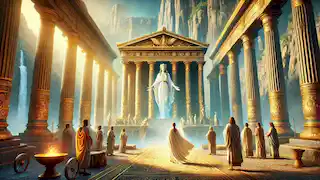High on the slopes of Mount Parnassus, where the sacred smoke from incense offerings rose into the heavens, stood a temple unlike any other in the ancient world—the Temple of Apollo at Delphi. Known throughout the ancient Greek world, the temple was home to the Pythia, the Oracle of Delphi, a mysterious priestess whose cryptic prophecies shaped the course of empires, kings, and warriors. This is the legend of the Oracle, a tale woven from myth, history, and the whispered breaths of the gods themselves. Delphi, nestled amid the rugged peaks of central Greece, was believed to be the center of the world, the omphalos, or navel, of the Earth. According to legend, Zeus released two eagles, one from the east and one from the west, and where they met, he declared, would be the center of the universe. That point was Delphi. The town’s prominence, however, did not come merely from geographical myth. It was the divine presence of Apollo, the god of prophecy, music, and healing, who sanctified Delphi as the home of the Pythia. His temple stood tall, surrounded by the majesty of nature, commanding respect from all who approached. In the beginning, the site was sacred to Gaia, the primordial Earth goddess. Her protector, the great serpent Python, guarded the site until Apollo arrived. The god, desiring the oracle for himself, slew Python with his golden arrows. Thus, the site became his sanctuary, and the Oracle, previously a voice for Gaia, was now his, a conduit for divine wisdom that would guide all of Greece. The Oracle of Delphi was not just a single priestess, but a title held by many women throughout centuries. These women, chosen from among the locals, were required to live lives of purity and isolation, devoting themselves to Apollo. The process of becoming the Pythia was shrouded in mysticism, for the role was not merely a human one. It was said that upon entering the sacred chamber of the temple, the priestess would fall into a divine trance, induced by inhaling fumes rising from a chasm in the earth. In this state, Apollo himself spoke through her, and her utterances were interpreted by priests to convey Apollo's will. The people of ancient Greece revered the Oracle’s words, and pilgrims flocked to Delphi from all corners of the Hellenic world. The kings of Sparta and Athens consulted the Oracle before going to war, and even commoners sought advice on personal matters, trusting in the divine wisdom the Pythia bestowed. In times of crisis, when the future seemed uncertain, the Oracle’s prophecies carried the weight of the gods themselves. However, the Oracle’s words were not always clear. Often, her prophecies were ambiguous, open to interpretation. The most famous of these cryptic utterances would be when King Croesus of Lydia, preparing for war with Persia, asked the Oracle if he should go to battle. The Oracle replied, “If you cross the river, a great empire will fall.” Confident, Croesus led his forces into war, only to see his own empire crumble instead. The sanctuary of Delphi had known prosperity for centuries, but the winds of change swept through Greece in the form of war. The Persian Wars, the Peloponnesian War, and later the rise of Macedon all shaped the destiny of Delphi and its Oracle. During the Persian invasion of 480 BCE, when the great King Xerxes sent his armies across Greece, Delphi faced one of its darkest moments. The Persians, intent on plundering the wealth of the temple, marched toward the sacred site. Terrified, the priests and citizens of Delphi prayed to Apollo for protection. As the Persian forces approached, something miraculous occurred. According to legend, great boulders fell from Mount Parnassus, crushing the invaders. The Delphians believed that Apollo himself had intervened, protecting his temple and his oracle from destruction. The Persian army, defeated by divine intervention, retreated, leaving Delphi untouched. But even as Greece entered a golden age under the influence of Athens and its allies, Delphi remained a focal point of both faith and politics. The Oracle continued to play a pivotal role, offering counsel on matters of state, religion, and war. Her influence was immense, but with power came danger. By the 4th century BCE, Greece was no longer united under the great city-states of Athens and Sparta. A new power was rising in the north—Macedon, under the rule of Philip II, father of Alexander the Great. Philip was a king of ambition, determined to unite all of Greece under his banner. However, he understood the importance of divine legitimacy. Before embarking on his campaigns, he sought the guidance of the Oracle at Delphi. The Pythia’s words to him were cryptic as ever, but Philip interpreted them as a sign that he would succeed in his quest. It was said that the Oracle had foretold not only Philip’s rise to power but also the incredible achievements of his son, Alexander. When Alexander visited Delphi before setting out on his campaign to conquer Persia, the Pythia told him, “You are invincible.” Armed with this prophecy, Alexander embarked on his conquest, which would eventually create one of the largest empires the world had ever seen. But the Oracle’s prophecies were not always seen as favorable. Those who felt they were given ill omens often left in anger or dismay, questioning the gods or the Pythia herself. Yet, even in such cases, the Oracle's reputation remained intact. It was the nature of prophecy, after all, to be enigmatic. Delphi’s prominence as a religious and political hub began to wane in the centuries that followed. The rise of Rome, the spread of new religions, and the gradual decline of traditional Greek belief systems all contributed to the fading influence of the Oracle. By the time the Romans had absorbed Greece into their empire, Delphi remained an important religious site, but it no longer held the same sway over rulers and armies. The Romans, though respectful of Greek traditions, had their own gods and their own oracles, such as the Sibyl of Cumae. Still, many Roman leaders, including emperors, sought the guidance of the Pythia. One of the last known prophecies of the Oracle came during the reign of the Roman Emperor Julian, known as Julian the Apostate, in the 4th century CE. Julian, a devotee of the ancient gods in a time when Christianity was spreading rapidly through the empire, sought the Oracle’s advice as he attempted to revive paganism. The Pythia’s response was a grim one: “Tell the king, the fair-wrought hall has fallen. No longer has Apollo a hut, nor a prophetic laurel. The water has dried up; the voice is stilled.” With these final words, the Oracle of Delphi declared the end of an era. The voice of Apollo, which had once guided the fates of kings and empires, was silent. Delphi, once the center of the world, became a relic of a bygone age. The Oracle of Delphi may no longer speak, but her legacy continues to echo through history. The temple, though now in ruins, still draws visitors from around the world, who come to stand where ancient kings and warriors once sought divine wisdom. The legends of the Oracle’s prophecies remain embedded in the stories of ancient Greece. The cryptic warnings and enigmatic guidance given to leaders like Croesus, Philip, and Alexander the Great shaped the course of history. In many ways, the Oracle was not just a voice for the gods but a symbol of the delicate interplay between fate and free will, a reminder that even the most powerful must look to something greater than themselves. The influence of Delphi extended beyond the borders of Greece. Ancient writers like Herodotus, Plutarch, and Aeschylus wrote about the Oracle, ensuring that her words would be remembered long after the temple fell into ruin. Her prophecies, although sometimes ambiguous or even misleading, have become emblematic of the power of belief and the mysteries of fate. In more recent centuries, Delphi and its Oracle have experienced a renaissance of sorts. Archaeologists and historians have worked tirelessly to uncover the remains of the temple, piecing together the history of the sanctuary and the Oracle’s role within it. The excavation of the temple site has revealed treasures that offer glimpses into the past—bronze statues, marble friezes, and intricate carvings that tell the story of Delphi’s importance in the ancient world. In literature, art, and philosophy, the Oracle of Delphi continues to inspire. The famous maxim inscribed at the temple, “Know thyself,” has been interpreted and reinterpreted by scholars, philosophers, and thinkers throughout the ages. It serves as a reminder of the wisdom that the Oracle imparted—not just in her cryptic prophecies, but in her call for introspection and self-awareness. Today, visitors to Delphi can still stand in awe of the ruins, walking among the remnants of the temple where the Pythia once sat, shrouded in mystery and smoke. The landscape itself remains as majestic as ever, with the towering peaks of Mount Parnassus providing a breathtaking backdrop. Delphi’s allure is not just historical. For many, it retains a spiritual significance. The site’s connection to the divine, to prophecy, and to the ancient gods continues to captivate those who seek to understand the mysteries of the past. The Oracle of Delphi remains one of the most enigmatic and enduring symbols of ancient Greece. Through her, the gods spoke to mortals, and her words shaped the fate of empires. Though her voice has long since fallen silent, the legacy of the Oracle lives on in the stories, the ruins, and the very spirit of Delphi. The Pythia's words may have been cryptic, but they carried the weight of destiny, and in their mystery, they revealed the complexities of both divine will and human choice. As we look back on the legend of the Oracle, we are reminded that the quest for knowledge, wisdom, and guidance is as old as civilization itself. The people of ancient Greece turned to the gods for answers, and the Oracle of Delphi was their mouthpiece, bridging the mortal world and the divine. Though the temple is now in ruins, the story of the Oracle continues, a testament to the enduring human desire to seek meaning in the face of the unknown.The Sacred Beginnings
The Rise of the Oracle
A Time of Crisis

The Oracle and the Rise of Philip of Macedon
The Oracle’s Final Years
The Legacy of the Oracle

Rediscovery and Modern Fascination

Conclusion

The Legend of the Oracle of Delphi
Reading Time: 9 min

About Story: The Legend of the Oracle of Delphi is a Legend Stories from greece set in the Ancient Stories. This Descriptive Stories tale explores themes of Wisdom Stories and is suitable for All Ages Stories. It offers Cultural Stories insights. A tale of divine prophecies that shaped the fate of ancient Greece.

















